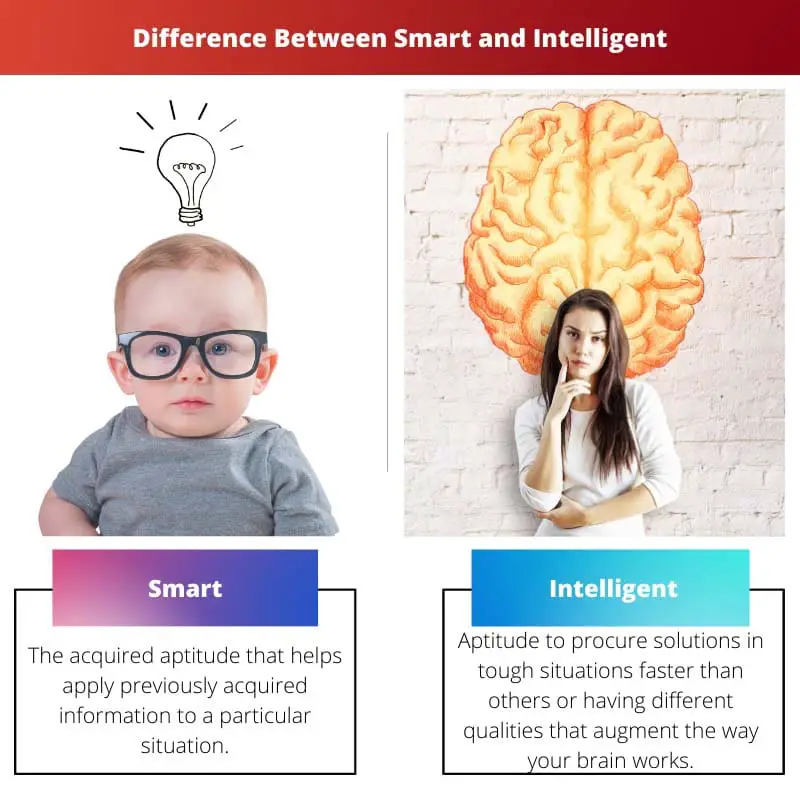Smart and intelligent are behavioural adjectives used to describe a person’s qualities. It is found that both words seem to be interchangeable, but that is untrue.
There is a difference between the meaning and use of the words.
Key Takeaways
- Smart refers to the ability to understand and apply knowledge quickly, implying practical problem-solving skills and adaptability.
- An intelligent person is described as able to process complex information, analyze data, and think abstractly, implying a high level of cognitive ability and reasoning.
- The main difference between smart and intelligent is the focus on practical problem-solving and adaptability for smart individuals, while intelligence emphasizes cognitive ability and abstract thinking.
Smart vs Intelligent
Being smart means having a good memory and the ability to learn quickly and retain information. It is related with academic performance and having a high IQ. Being intelligent, means having the ability to think critically and use knowledge to solve problems and make decisions.

Smart is a learned behaviour. It is a behaviour that can be adopted over time.
Whereas, Intelligence is an inherent quality. People are born with it.
Being smart can be defined as an acquired aptitude that helps apply previously acquired information to a particular situation. Intelligence is the aptitude to procure solutions in challenging conditions faster than others or having different qualities that augment how your brain works.
Comparison Table
| Parameter of Comparison | Smart | Intelligent |
|---|---|---|
| Definition | The acquired aptitude helps apply previously acquired information to a particular situation. | Aptitude to procure solutions in challenging situations faster than others or having different qualities augmenting your brain’s work. |
| Nature | Practical, objective, applied, and hands-on. | Subjective, complex, innate, and comprehensive. |
| Origin | Comes through learning. It is a trait that is acquired from learning. | Inborn trait. It is a quality that comes naturally to a person. |
| Measurement | Smartness cannot be measured. | Intelligence can be measured with IQ tests. |
| Refers to | Appearance, day-to-day behaviour, and application of previously acquired knowledge in the present situation. | This refers to the ability to gain knowledge or information quickly and the ability to reason. |
Who is Smart?
“Smart” refers to learned interpretations like making intelligent, emotional or business decisions. Smart is an earned status.
Studying, reading, learning, and educating oneself about a particular subject or topic makes the person smarter in that topic.
Smart can also be related to sarcasm. A person can be deemed ‘smart’ if he/she gives witty or sarcastic answers or makes sardonic comments in a conversation.
While describing appearances, ‘smart’ is a frequently used word. We hear comments like, “she is a smart dresser” or “you look smart today.”
It simply means that the person has dressed aptly for the situation and is looking exceptionally well. This never implies that the person is an intelligent dresser.
Smartness implies adapting to different conditions and situations swiftly and quickly. It is used in day-to-day living situations and is seen to be a practical, hands-on, and desirable quality.
The word brilliant gives birth to words like- ‘street-smart’ and ‘book-smart’.
Street-smart is an expression that describes people who can adapt to all kinds of neighbourhoods, learn the workings of their surroundings, and deal with all sorts of personalities confidently and practically. Street smartness arises from experiencing situations and learning by almost adjusting to different conditions.
Book-smart is an expression to describe people who gain knowledge through studying and reading books rather than learning from practical situations.
An intelligent person possesses the following traits:
- Apt judgment skills
- Practical skills
- Adaptive in nature

Who is Intelligent?
Derived from the word ‘intelligence’, intelligent is an adjective. It is the capability to obtain and apply knowledge, information, and skills.
Intelligence is an inherent quality, a quality with which one is born. The measurement of one’s intelligence can be done through IQ tests.
A person can attain knowledge and process it.
Being intelligent is deemed an outstanding trait but isn’t thought to be a practical one as the highly intellectual mind isn’t something everyone can understand.
Intelligence is an innate quality and is inherited. Our genetic structure gives birth to it.
Thus, no individual efforts are required to be an intelligent person. Instead, the inherent intelligence in a person can be polished by gaining knowledge and making good use of it.
Nevertheless, only intelligence is not enough to round off the personality of anyone. Intelligence does not deem a person witty, intelligent, clever, or sarcastic.
It only refers to the capability of obtaining knowledge efficiently.
Intelligence does not refer to the capability of a person to apply the acquired knowledge to real-life, practical situations. Thus, it is said that some intelligent people might not be efficient.
People with high-level intelligence are mostly highly complex and impractical. They’re thus also absent-minded in some cases.
An intelligent person possesses the following traits:
- Obtains and comprehends new concepts swiftly and easily
- Possess a high level of IQ
- Responds or react to things in a thoughtful way

Main Differences Between Smart and Intelligent
- The main difference between smart and intelligent lies in the origin of the two. Smart Is an acquired or obtained trait, whereas intelligence is a trait with which people are naturally born.
- Smartness is about using the obtained knowledge and applying it to practical situations. Intelligence is about gaining knowledge easily and swiftly.
- Smartness cannot be measured, whereas IQ tests can measure intelligence.
- Smart can describe a person’s appearance, sarcasm, or wit. At the same time, we cannot use the word intelligent to describe someone’s appearance.
- Smartness is objective, simple, and practical. At the same time, intelligence is complex, subjective, and impractical.


The main difference between smartness and intelligence is beautifully portrayed in this article. Thumbs up!
This is a profound and well-researched exploration of the definitions of smart and intelligent. Great read!
After reading this article, I feel I have a much better understanding of what sets smartness apart from intelligence. The author’s logic is compelling and insightful.
The article does an incredible job of outlining the differences between smart and intelligent individuals with logical and well-thought-out arguments.
I find this article super informative and well-explained. It gives a clear distinction between the two terms and is incredibly accurate!
The author has done an excellent job explaining the difference between smart and intelligent, offering clear and well-organized insights.
The article does a great job of illustrating the clear differences between smart and intelligent individuals in a well-articulated manner.
This article is very detailed in its explanations, and the points made are well-supported.
This is a very insightful and thought-provoking article, providing a comprehensive examination of the differences in an accessible and engaging manner.
I find this article to be thoroughly enlightening, providing a thorough understanding of the differences between being smart and intelligent.